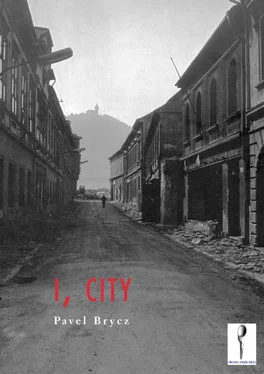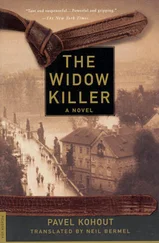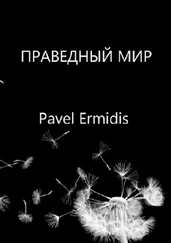Pavel Brycz - I, City
Здесь есть возможность читать онлайн «Pavel Brycz - I, City» весь текст электронной книги совершенно бесплатно (целиком полную версию без сокращений). В некоторых случаях можно слушать аудио, скачать через торрент в формате fb2 и присутствует краткое содержание. Год выпуска: 2006, Издательство: Twisted Spoon Press, Жанр: Современная проза, на английском языке. Описание произведения, (предисловие) а так же отзывы посетителей доступны на портале библиотеки ЛибКат.
- Название:I, City
- Автор:
- Издательство:Twisted Spoon Press
- Жанр:
- Год:2006
- ISBN:нет данных
- Рейтинг книги:5 / 5. Голосов: 1
-
Избранное:Добавить в избранное
- Отзывы:
-
Ваша оценка:
- 100
- 1
- 2
- 3
- 4
- 5
I, City: краткое содержание, описание и аннотация
Предлагаем к чтению аннотацию, описание, краткое содержание или предисловие (зависит от того, что написал сам автор книги «I, City»). Если вы не нашли необходимую информацию о книге — напишите в комментариях, мы постараемся отыскать её.
Dubliners
I, City
I, City — читать онлайн бесплатно полную книгу (весь текст) целиком
Ниже представлен текст книги, разбитый по страницам. Система сохранения места последней прочитанной страницы, позволяет с удобством читать онлайн бесплатно книгу «I, City», без необходимости каждый раз заново искать на чём Вы остановились. Поставьте закладку, и сможете в любой момент перейти на страницу, на которой закончили чтение.
Интервал:
Закладка:
Pavel Brycz
I, City
AN APPEARANCE, HEROIC
If you stop at the corner of two streets — there among the small houses you might know as Na Špačkárně, in the quarter of the city irreversibly called Stalingradská (at least that’s what people still call it, for there is no greater paradox of history than calling the small by great names) — you will encounter two memorials to the victims of the miners’ strikes of Most.
The strikes numbered two, during them eight people were shot. One strike was in 1920, the second and more famous one in the Year of Our Lord 1932. I am not a poet, I am a city, ill equipped to write about the affairs of people. I am a city, a new city. I cannot bear witness to the past, I can describe only what I see.
And here, among the full-grown, needle-leaved shrubs, I see a stone.
And on the stone:
THIS & THAT, FROM HERE & THERE, AGE, MINER
THIS & THAT, FROM HERE & THERE, AGE,
MASTER SHOEMAKER
One sunny day in June, a twenty-six-year-old poet born in Old Most brought his friend Pedro from Lisbon to the memorial.
The poet thought he’d introduce his friend, the Portuguese poet, to the utter absurdity he experienced in his every encounter with the memorial to the miners’ strikes. He laughed at the mere memory of the Youth League shirts worn by he and his Gymnasium classmates, released from afternoon lessons and obliged to stand astride the officers of the army and the people’s militia. Comrades laid wreaths, another comrade delivered a speech, and after the address the Internationale was sung. The Gymnasium boys, like our poet, were born in the year 1968. They couldn’t stand memorials, comrades, Youth League shirts or wreaths.
And they couldn’t stand the Internationale .
But they liked playing pranks.
“So we also sang the Internationale , to the grumbling of those fat old farts, who were in uniform, with their rifles slung over their shoulders, but we sang it in the original, in French,” Most’s poet explained to his Portuguese friend. “They were totally confused, as were our teachers, and the army officers as well, none of those comrades knew what to do, even given their excellent cadre profiles, the lessons they’d learned about crisis development engraved deep in their faces. They didn’t know whether they were supposed to forbid our singing as an impertinent provocation, or to appreciate that for the first time we were singing along with them, in unison.
“We sang, and in so doing we laughed at their parades, at their memorials, at their eternal fear of a freedom that for them was only the recognition of necessity.”
Most’s poet finished his story, and approached the memorials. The Portuguese poet read to himself the names of the long dead as well.
And, suddenly, they became completely serious, and forgot the laugh for which they had come. No longer was there the absurdity of the Internationale and the Youth League shirts. Only the two of them and the shot dead remained, and the young men felt a profound sadness for the fact that people sometimes don’t know how to be people.
I am only a new city, not a person.
I am not a hero. I have never defended my walls. But when people on my streets and in my houses are truly human, I feel heroic.
I have remembered these poets.
AN APPEARANCE, NOSTALGIC
Sometimes, I feel like meeting my Old Town. I dream that my new streets would hitch to its cobblestones, that the Běla would flow through the old riverbed and me and Old Most would be Siamese twins, the Gemini glued, the Moon in conjunction with the Sun.
I know it’s not possible, and the remnants of Old Most only reassure me.
I’ll never step into the same Běla twice with my Old Town, but if cities die like everything else alive on this planet, then I believe that one day we’ll meet in Paradise.
Until then, with me it’s like in that poem upon the theme of the UNENCOUNTER, which a man dedicated to a woman he never met:
No, I didn’t see you in the Berolina neon —
a circus that came from the Alps.
Perhaps the huge elephants hid you from view —
perhaps the camels, perhaps the darkness.
You were in the front row with a beautiful lady?
But I was there, too!
Both of us with mommies —
the pistachio ice cream…
No, I didn’t see you in the whirl of masks —
perhaps my pride was evil.
Perhaps the cowboys hid you from view —
perhaps the princesses, perhaps the darkness.
You were in the mask of a beautiful lady?
But I was, too!
Both of us with mommies —
the pistachio ice cream…
No, I didn’t see you at our school’s ball —
perhaps I was drunk as a Dane.
Perhaps the white mice hid you from view —
perhaps the camels, perhaps the darkness.
You sat in the gallery with a pretty lady?
But I was there, too!
Both of us with mommies —
the pistachio ice cream…
What more can one say?
Sometimes, all the pistachio ice cream runs out.
AN APPEARANCE, AMOROUS
Love is a Magnetic Mountain. If it gets hold of you, it doesn’t let go. It will never forsake you. I, city, know that well.
For ten years, on the sidewalk under the windows of the boarding school, i love you had been painted in red by an unknown author, until — with the rain, snow, and sun — it was gone.
All the girls living behind those windows could confirm this. Speaking for them all, there is, for example, Zora Vesecká — child star of ’70s television — who, during her short stay in the city, observed herself as the object of this declaration, too.
I remember the inscription of an unknown vandal on the wall of the army barracks:
MY GOD, MY GOD, WHY HAST THOU FORSAKEN ME?! Who so desolated his heart?
And who was the author? Was he a soldier, a student of theology, or possibly both?
Both.
He who has not been to Hněvín has not been to Most.
And what citizen hasn’t been there on a date at least once in his life?
Well, as I’ve said:
Love is a mountain.
Hněvín is a Mountain Magnetic.
AN APPEARANCE, LINGUISTIC
Prague is a small Paris. Whenever you come to the Champs Elysées, you can meet Prague there. She is small, lost, crying, she takes you by the hand and wants home.
Most is also Prague, Paris, Babylon, but linguistically speaking. As people came to metropolises from all over the place, a tangle of languages arose. It’s not any different in Most.
After all, nearly all Mosters have made their ways here from other places, and by now their language has become an industrial conglomerate. From the older residents you can still hear the influence of hard Sudeten German. And so the Czech of my citizens doesn’t sing like the speech of Hradecers, Budějovicers, Brnoers or Břeclavers.
Hearing the talk of a Moster, you can most often mistake him for a Praguer.
Yet it is possible to sing even in the Czech of Most. It is, however, a song of a burnt tongue, of a burnt land, and so all the more convincing.
Everyone who cares for it has a soul, though short of breath from the everlasting smog and distressed by the great expanses of concrete apartment blocks — yet a soul. And only a soul gives words meaning and joy to speech.
Believe me: though I am only a city, I don’t want my heart’s people to be mute.
Читать дальшеИнтервал:
Закладка:
Похожие книги на «I, City»
Представляем Вашему вниманию похожие книги на «I, City» списком для выбора. Мы отобрали схожую по названию и смыслу литературу в надежде предоставить читателям больше вариантов отыскать новые, интересные, ещё непрочитанные произведения.
Обсуждение, отзывы о книге «I, City» и просто собственные мнения читателей. Оставьте ваши комментарии, напишите, что Вы думаете о произведении, его смысле или главных героях. Укажите что конкретно понравилось, а что нет, и почему Вы так считаете.












